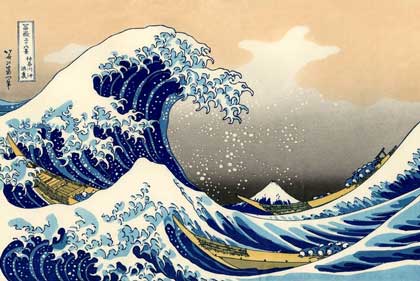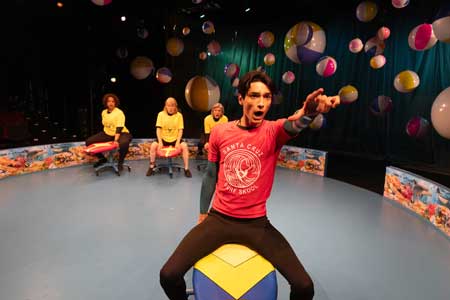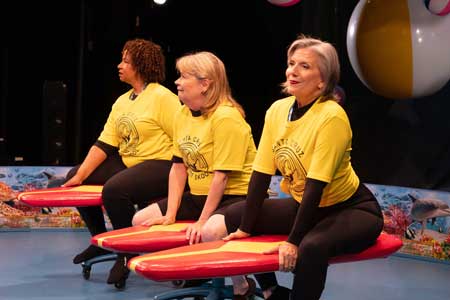Play (2024)
by Aurora Real de Asua
Directed by Shana Gozansky
Gloucester Stage Company
July 5-28, 2024
With Cheryl D. Singleton (Claudia), Noelle Player (Wynn), Karen Macdonald (Margaret ‘Gary’), Thomas Bilotta (Blaze)

Hokusai
Three old friends, Claudia (Cheryl D. Singleton), Wynn (Noelle Player), and Margaret, who also goes by the name Gary (Karen Macdonald), have come together to take a surfing lesson; Blaze (Thomas Bilotta) is their young male teacher. As they sit on their surfboards – where they remain (wonderfully!) for the entire show – all kinds of issues arise about their relationships and states of well-being; even Blaze’s life gets probed.
There are some truly wonderful and poetic moments in this curiously conceived narrative, set entirely on a series of surfboards. Though much of the opening of the play seems superficial and trivial, focusing on a lot of banter about men’s bodies, sexuality and relationship, as the play progresses things begin to become more complex. As pairs of characters engage in more intimate conversation, we learn somewhat more about each of them, though much of the revelation about what is going on is left for the last few minutes of the play.

With Cheryl D. Singleton as Claudia
Karen Macdonald as Margaret ‘Gary’
Noelle Player as Wynn
in “Wipeout”
Photo: Jason Grow Photography
Courtesy of Gloucester Stage Company
One of the great poetic moments is offered by Blaze, who speaks eloquently at one point about the feeling of catching a wave. The writing here is beautiful and Thomas Bilotta’s delivery is wonderful. Bilotta, generally, is one of the bright lights in the show. Early on, his spiffy and articulated movements and gestures are purely entertaining and captivating. But, later in the show, as his own story emerges, Bilotta really conveys a sense of depth to this young man’s character. It’s a lovely performance.
As Margaret aka Gary, Karen Macdonald, a seasoned, versatile, and well-known actor on the Boston-area stage, brings a droll and forceful quality that melds into something quite different once we learn of the complexities in her situation. Gary is a lesbian, but seems to go along well with the banter among the three women about men’s bodies, and Macdonald, with her wryness and force-of-nature capacities, manages to convey that without complication. She, like Bilotta, draws one’s attention magnetically and manages to bring focus and compassion to her complex character.
As Wynn, Nelle Player has the somewhat difficult challenge of being a bitchy character who somehow holds onto old friendships. One suspects that the writing is meant to be sarcastic and funny, though in this rendition it comes across as more mean and less funny. But, in the end, when there is an opportunity for some development, Player pulls that off with considerable subtlety. It’s a nice moment between her character and Bilotta’s that makes for that transition, and though quite subtle, it really hits home.
Cheryl Singleton’s Claudia has perhaps the most dramatic evocation when her opportunity to express herself more vividly comes along, but we wonder how this character who seems rather milquetoasty at the outset gains such force later on. There is not enough said in the script to enable that kind of foreshadowing, which leaves a lot up to the actor. Singleton, and director Shana Gozansky, opt to create a stark dramatic contrast between that earlier and later portrayals without offering too much anticipation of the dramatic change that occurs. But that is true of Macdonald’s Elizabeth aka Gary as well. We are bathed in a kind of innocuousness early on and have more profound things to deal with as things develop, which gives substance to the play but with what seems a bit too elongated frivolous introduction.

Karen Macdonald as Margaret ‘Gary’
Noelle Player as Wynn
in “Wipeout”
Photo: Jason Grow Photography
Courtesy of Gloucester Stage Company
In that sense, the play has substance and merits attention, though there is enough that is unexpected and challenges one’s sense of belief and consistency to wonder about its basic presumptions and structure. With the nature of the drama that unfolds, would a character like Claudia actually have engineered a surfing lesson for the three friends? That presumption challenges one’s beliefs, but this is, of course, the stage, and the place for fantasy. In that sense, why not?, but it does challenge one’s sense of the plausible.
– BADMan (aka Charles Munitz)
Leave a Reply